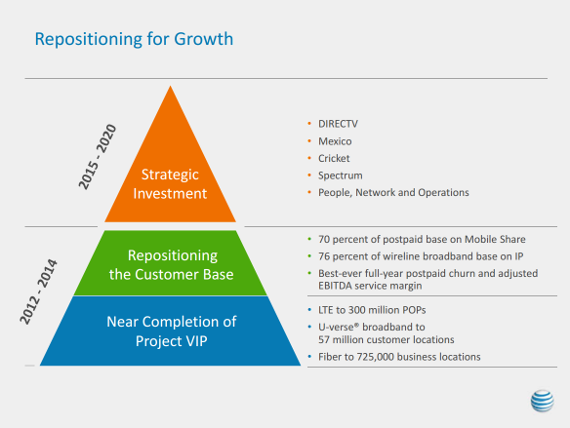
AT&T saw the past three years as a repositioning period, setting the company up for stronger growth in 2015 and beyond. Source: AT&T.
Shares of telecom giant AT&T (T 1.13%) rose 1.8% in after-hours trading, following the release of strong results for the fourth quarter of 2014.
AT&T's non-GAAP earnings rose 4% year over year to land at $0.55 per diluted share. Total revenues increased by 4.5% to $34.4 billion, adjusted to account for the sale of Connecticut wireline operations to Frontier Communications (FTR +0.00%).
The quarter matched Wall Street's earnings estimates to a "T" while exceeding the revenue consensus by $100 million.
In the crucial wireless division, AT&T saw sales rising 7.7% thanks to higher data service charges. Ma Bell added 1.9 million net new subscribers during the quarter, including 854,000 net postpaid accounts.
As a reminder, AT&T's archrival, Verizon Communications (VZ 0.68%), reported 2.1 net new connections in the fourth quarter, including 672,000 new postpaid phone lines.
Smaller rival T-Mobile US (TMUS 1.70%) won't report final results for another couple of weeks, but it announced preliminary fourth-quarter additions of 2.1 million net subscribers including 1.3 million postpaid gains. Sprint (S +0.00%) added 1 million new subscribers in the fourth quarter with 30,000 new postpaid subscribers, according to another preliminary report.
The vast majority of AT&T's wireless contracts are attached to its AT&T Mobile Share family plans, and over half of smartphone upgrades and additions are taking the AT&T Next rapid upgrade plan.
In the wireline segment, AT&T reported flattish sales and operating income. A 22% increase in U-Verse high-speed data and digital television service sales just about balanced out the relentless decline in traditional voice line accounts.
Looking ahead, AT&T provided two sets of expectations for 2015. If the proposed acquisition of satellite TV broadcaster DirecTV (DTV +0.00%) completes in its current form, alongside numerous smaller pending deals in Mexican market, the combined company should deliver adjusted earnings growth "in the low single-digit range." In other words, the deal would hurt AT&T's bottom line at first but add profitable synergies over the long haul.
Without DirecTV and Mexico, earnings should still grow at the same single-digit percentage rate. The company didn't present any firm guidance ranges, but these directional statements were optimistic at heart.








